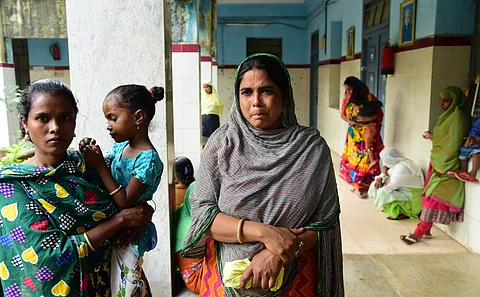

BENGALURU: A long distance away from here, across the India-Bangladesh border are villages, where agents carry stories of a “rich” Bengaluru to poor, gullible villagers, who risk their last Taka to be smuggled into India for a life beyond hunger and poverty.
These dream merchants lure the unemployed and impoverished people in Bangladesh to travel to Indian metros for work, and charge a fee between Rs 6,000 and Rs 7,000 per person to smuggle them into India.
"We had no work in Bangladesh and were starving. We sold whatever little we had to pay the agent, and he packed us into a crowded bus, which ferried us across the border in the middle of the night. From Kolkata, the agent brought us to Bengaluru by train and introduced us to other Bangladeshis, whom he had brought in earlier," says teary-eyed Shahnaz.
The 38-year-old Bangladeshi and mother of three, along with 12 women and six children, is housed in the government home for women and children on Hosur Road. On October 27, the city police had rounded up 58 illegal Bangladeshi immigrants from makeshift tenements (jhuggis) in Whitefield and Ramamurthy Nagar, to be repatriated to their country.
Women and small children were taken to the government home on Hosur Road, and the men were taken to another government facility. Four boys in the age group of nine and 14 years were lodged in the government boys’ home. There is a movement restriction order on the detained illegal immigrants by the Foreigners’ Regional Registration Office (FRRO). The police, with the help of their counterparts in Bangladesh, have prepared their documents for repatriation. “Their documents are ready. There is some delay in repatriating them. It could be because of funds,” said a police officer.
Fear and the uncertainty of what lies ahead, threw a shadow across the faces of the 13 women lodged in a government home. The youngest of them looked like a teenager, as she sat demurely on the floor, her head covered, while her toddler, aged under two, slept on her lap without a care. Her husband, also a ragpicker, is in the other government home. Separated from their husbands and brothers, the women look distraught, afraid and nervous.
“We don’t know where our men are. We are very scared. This is a strange place. We have food and shelter here, but none of us feels like eating. Police told us they would send us home. But they don’t tell us when,” said Rabia (27), holding her younger child in her arms while the older one hangs on tight to her kurta and stares at her mother. “The police took our phones away. Can you ask them to allow us to talk to our husbands once?” she pleaded.
The stories of these illegal Bangladeshi immigrants are threaded in hunger. They paid their last Taka to be smuggled into an alien country, where they could earn to eat and have a tent over their heads. On reaching Bengaluru, the men took to ragpicking and the women lied about their nationality to get odd jobs in apartment blocks or paying guest accommodations.
“Nobody wants a Bangladeshi, so we have to lie to earn our bread. I told my employer I was Assamese. She would not have employed me if I had told her I am a Bangladeshi. We watched Hindi films to learn Hindi. My husband earned between Rs 300 and Rs 400 as a ragpicker here. My two children were born here, inside the jhuggi,” said Shahnaz.
A young girl who stood behind Shahnaz, wept bitterly. “That morning, police took my brother away. We were screaming as we were herded into police vans. We are not criminals. We are poor and there’s nothing for us in our country. But now we will never return to India,” she cried.
Haseena, the eldest of the lot, came forward and spoke softly. “I have two names. Haseena in Bangladesh and Rekha in Bengaluru,” she said, holding the talisman around her neck wrapped in black cloth. Her eyes bore no expression.